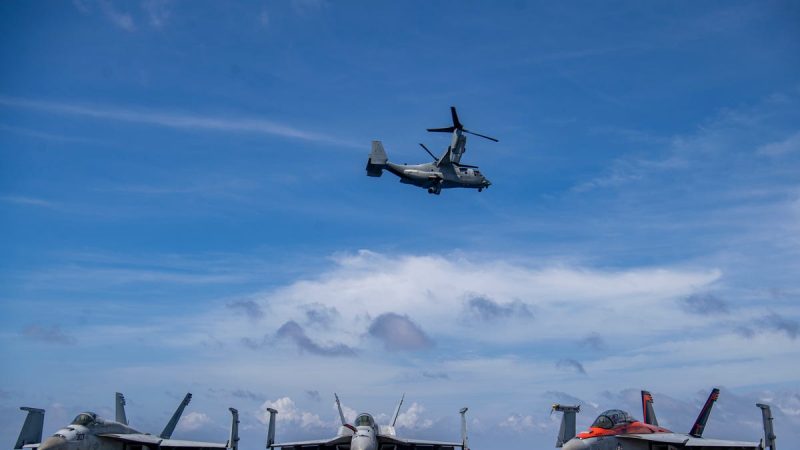China has stepped up its diplomatic and military pressure against Taiwan, alarming U.S. officials and allies in the region that Beijing is looking to take back the island by force.
If projections of a Chinese military invasion to retake Taiwan are accurate, the U.S. can utilize artificial intelligence (AI) and other technology that will indicate to forces in the region that China isn’t engaging in yet another provocative military exercise but is launching the invasion so many predict.
According to experts, AI and machine learning (ML) can help the U.S. and its allies in the region improve the speed and efficiency of war plan development, intelligence assessments and targeting effectiveness.
Retired Rear Adm. Mark Montgomery, who serves as senior director of the Center on Cyber and Technology Innovation at the Foundation for the Defense of Democracies, told Fox News Digital AI and ML can help U.S. intelligence experts process the immense amount of surveillance data covering China and the Western Pacific Ocean the U.S. is ingesting.
‘This data needs to be rapidly processed, evaluated and disseminated, and AI and ML can make that a more agile and efficient process. This, in turn, can give the U.S. military and policymakers decision-making advantages,’ Montgomery added.
Decision-makers can easily misinterpret the intentions of hostile forces, mistaking training exercises as an actual prelude to military action. New technology can prevent the possibility that miscalculation will lead to an unnecessary armed confrontation.
‘When we are left in a spot where we can no longer derive enemy intentions — would-be enemy intentions — from their disposition in the field, we must go deeper, and that requires data, compute, talent. … What are those indications and warnings?’ Adm. Samuel Paparo, the commander of the U.S. Pacific Fleet who was recently nominated to lead U.S. Indo-Pacific Command, told a conference hosted by the Defense Innovation Unit, as reported by Breaking Defense.
Paparo said the erosion of strategic, operational and tactical warnings is a real concern.
‘It presents a challenge to the joint force in our ability to go deeper, to find those indications and warnings that will enable us to be postured to support our allies and partners, and — if so — called by the commander in chief and answer to the readiness to defend Taiwan should the PRC decide to settle matters by the use of force,’ Paparo was quoted as saying in a Breaking Defense article.
The growing fear among policymakers in Washington is that China is preparing to invade Taiwan and reunify it with the mainland by force, reversing decades of democratic self-rule. China ramped up its military activities in the Taiwan Strait following Congresswoman Nancy Pelosi’s controversial visit to Taiwan in August 2022. China sent 727 aircraft in and toward Taiwan’s airspace in 2022 and sent 850 planes in the first half of 2023, according to the Stimson Center.
Some in Beijing perceived the former House speaker’s visit as the U.S. moving away from its long-held recognition of the ‘One-China’ policy that has undergirded the approach to Taiwan since 1979. Several military officials have warned recently that China plans on invading Taiwan in the coming years.
‘Taiwan is clearly one of their ambitions, and I think the threat is manifest during this decade, in fact, in the next six years,’ Adm. Philip Davidson, commander of the U.S. Indo-Pacific Command, told a Senate Armed Services Committee hearing in 2021.
It’s not just policymakers and observers of the region saying China will attack Taiwan. Chinese President Xi Jinping is on record and been candid about his ambitions toward Taiwan ahead of the 100th anniversary of the People’s Republic of China.
In his 2023 New Years address, Xi said reunification with Taiwan was inevitable and that the rejuvenation of the Chinese nation will be achieved by 2049, the 100th anniversary of the founding of the PRC. As far back as 2012, Xi said ‘achieving rejuvenation is the dream of the Chinese people.’
And a resolution adopted by the CCP Central Committee in November 2021 stated, ‘Resolving the Taiwan question and realizing China’s complete reunification is a historic mission and an unshakable commitment of the Party.’
A recent war game conducted by the Center for Strategic and International Studies predicted a U.S. victory over China, with staggering deaths and casualties, including ‘dozens of ships, hundreds of aircraft and tens of thousands of service members,’ for the U.S. and its allies.
Other war games conducted by the Department of Defense, the House Select Committee on China and various other think tanks resulted in similar conclusions.


